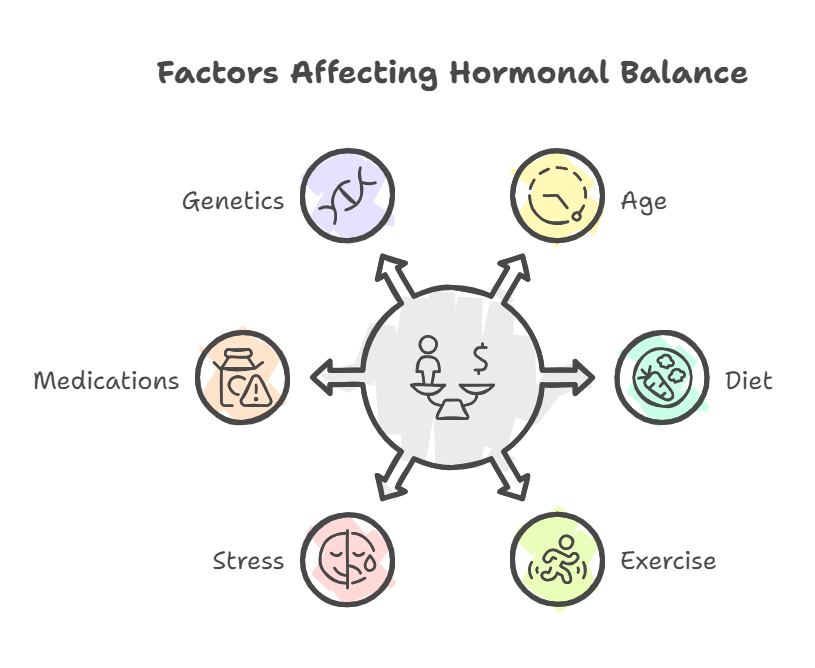Feeling out of sync? Like your internal orchestra is playing different tunes? A hormonal imbalance might cause issues like mood swings and a slow metabolism. To achieve “hormone harmony,” understand and adjust these signals for better health.
“Hormonal balancing means feeling better and living longer.”
Integrative Medical Clinic of North Carolina
Hormonal balance refers to having optimal hormone levels. Achieving and sustaining this hormone harmony supports a healthy body and mind.
Understanding Hormone Harmony
Hormones are vital messengers in our bodies. They influence many functions. This goes beyond what we usually consider, such as menopause and reproduction.
Hormones regulate various body processes, like metabolism, homeostasis, growth, and sleep. Irregular periods or other imbalances can cause notable health issues.
Common Hormonal Imbalances
Fluctuating hormone levels can lead to thyroid issues, which are most common. Conditions like Cushing’s syndrome and Addison’s disease also show hormonal imbalances.
Hormone fluctuations can make it hard to get pregnant, carry the baby, and cope after delivery. Hormone levels change naturally at different life stages. They can also get unbalanced from illness, genetics, stress, lifestyle, or diet. All of those should be kept in check for maintaining a more balanced life1.
Key Factors Impacting Hormone Harmony
Various factors affect your hormones, such as age, lifestyle choices, medications, and genetics. Hormonal fluctuations occur naturally throughout life, but external influences can either support or disrupt balance.

The food you eat, the quality of your sleep, and your stress levels all play a crucial role in regulating hormone production.
Certain medications and environmental toxins may also interfere with your endocrine system, making it harder for your body to maintain stability. By understanding these influences and making mindful choices, you can support your body’s natural ability to achieve hormone harmony.
| Factor | Impact on Hormones |
|---|---|
| Age | Hormone levels change naturally with age, affecting puberty, fertility, and aging. |
| Diet | Nutrient-rich foods are good for hormone production. Lack of nutrients might disrupt them. |
| Exercise | Exercising regularly helps hormonal balance by regulating cortisol and insulin. |
| Stress | High stress management increases cortisol, affecting reproductive hormones and thyroid function. |
| Medications | Some medications can disrupt hormone levels. |
| Genetics | Genetic factors affect hormone-related health and how your body reacts to the factors above. |
The Role of Lifestyle in Hormonal Health
Daily habits, such as working out regularly, greatly affect your hormones. They interact with the factors we discussed. Making smart decisions each and every day helps to regulate your body.
Food choices and meal times influence how the body uses hormones. This includes insulin and cortisol. A balanced diet is key for our body’s complex processes. Many women are making these changes on their wellness journey.
Practical Steps to Enhance Hormone Harmony
Managing hormone health goes beyond just identifying conditions and taking medication. Incorporating daily strategies is vital for maintaining your overall health. It starts with giving your body enough time to recover through good sleep habits.
Good sleep helps your brain clear out waste, aiding in the removal of waste from brain cells. Basic relaxation methods also help manage these functions and make for good mental wellbeing2.
Mindfulness and Stress Reduction
Meditation and quiet time help lower stress. Simple “me time” can decrease cortisol levels, improving hormonal balance.
These practices fit into functional medicine, affecting women’s lives positively. Improving your mental health helps keep the body balanced as a whole.
Diet and Nutrition for Hormonal Balance
The impact of our food on internal health is well-known. Eating nutrient-rich foods helps our body’s glands produce and use hormones correctly.
Eat magnesium-rich foods, such as nuts and seeds. You can also take a magnesium supplement3 to help regulate hormones. Vitamin D, zinc, and omega-3 fatty acids can help. But, always talk to a doctor before changing your routine or taking any supplements.
Navigating Hormone Harmony Through Life Stages
Our hormones shift throughout life. In teenage years, hormonal surges during puberty boost oil gland activity, causing oily skin and acne.
Our skin reflects our internal state, especially during puberty. Hormonal fluctuations during this time can lead to breakouts and skin concerns. Cleansers like La Roche Posay Toleriane and CeraVe Cream to Foam Cleanser can be effective in maintaining clear skin. Using a gentle cleanser can help you feel your best while letting your body grow as it should.
To better understand how hormones influence your skin and overall well-being, check out our guide on how to control hormones.
Hormone imbalances can cause infertility, mood swings, foggy thinking, weight gain, and mood issues. Balancing hormones involves understanding how life stages like reproduction and menopause affect them4. Key reproductive hormones such as estrogen, testosterone, and progesterone, impact sexuality and fertility, needing constant optimal levels for proper hormonal balance.
Hormonal Changes During Pregnancy
Pregnancy causes significant hormonal changes, leading to skin issues like acne and effecting a woman’s reproductive health. We want our baby to be as healthy as possible.
Pregnancy-safe skincare options can help manage these sensitivities. Later in life, during menopause, women see decreases in estrogen and collagen, and men experience lower testosterone during andropause.
Supplements and Hormone Harmony Ingredients
Diet changes and natural methods work together to create a solid foundation for hormone balance. Consuming nutrient-dense foods, staying hydrated, and reducing processed sugar can significantly impact hormonal health.
Supplements like vitamin D and magnesium also play a crucial role. Vitamin D supports immune function and mood regulation, while magnesium helps reduce stress and improve sleep quality—both essential for maintaining optimal hormone levels.
For a deeper dive into the best foods that naturally support hormone balance, check out our guide on hormone-balancing foods.
Many herbs and therapies are discussed for managing hormone balance. Not all herbs suit everyone; even with professional guidance, consider their use carefully based on individual needs and reactions5.
Supplements and Harmony Hormone Balance
Vitamin B6 boosts metabolism, aiding in food processing. Supplements like vitamin D and zinc can support overall health. Talk to your doctor about the benefits of supplements. Also, consider getting allergy testing before trying anything new, even natural ingredients.
Integrating Natural Approaches
Natural supplements can also help with PMS symptoms. Many believe Western Herbal Medicine helps with cramps and irregular periods. This relief can benefit both their bodies and minds.
These methods are great for personal routines. They help you take charge of your women’s health. Some look at using a “hormone harmony” supplement or something called “happy mammoth“. Always make sure to work with a health professional.
Frequently Asked Questions
What does the Hormone Harmony do?
Hormone Harmony means keeping hormones balanced in the body. Hormones play a key role in managing body functions. They help with sleep, metabolism, reproduction, and much more. A supplement for “hormone harmony” would help you stay balanced in your everyday life.
What are the side effects of Hormone Harmony tablets?
Side effects differ among products. Hormone therapy may lead to side effects. These include a higher risk of some medical conditions. Check out reviews for “happy mammoth hormone harmony” for more context. Just keep in mind that these reviews reflect only one person’s opinion.
Does Hormone Harmony help with weight gain?
Hormonal balance significantly affects metabolism and weight loss. Hormone Harmony can enhance metabolism and body functions when working correctly. Contact customer service for any questions about the “hormone harmony” supplement.
What is the active ingredient in Hormone Harmony?
Many active ingredients exist for Hormone Harmony, depending on the product. Dietary supplements have various natural, supportive ingredients. Always carefully review the main content on labels. Some use traditional herbs like black cohosh to address female issues.
Conclusion
Our journey constantly evolves, filled with ups and downs. However, prioritizing exercise can have a profound impact on hormonal balance. Regular physical activity stimulates the production of endorphins, reducing stress hormones like cortisol while promoting overall well-being.
Additionally, a study found that simply sitting outside and immersing yourself in nature can significantly lower stress-related hormone levels. Exposure to natural light helps regulate circadian rhythms, while fresh air and green surroundings contribute to reduced blood pressure and improved mood.
These practices—staying active, embracing nature, and maintaining a balanced lifestyle—are essential for achieving true hormone harmony. By incorporating them into your daily routine, you can enhance emotional stability, boost energy levels, and support long-term hormonal health.
Small Step, Big Impact
Start by incorporating a variety of fruits and vegetables into your diet to support hormone production. Engage in regular physical activity, like brisk walking or yoga, to help regulate hormonal balance. Consider consulting with a healthcare provider to assess your hormone levels and discuss personalized strategies.
- https://www.miye.care/en/how-do-you-restore-hormonal-balance-in-the-post-partum-period/?srsltid=AfmBOop_TcXbHs1CAY6G94AHj4l7uQSiMYfjFM1nFwsFgc_KKe-FvlU1[↩]
- https://medicine.washu.edu/news/neurons-help-flush-waste-out-of-brain-during-sleep/[↩]
- https://www.mygkb.com/Article/Detail/843[↩]
- https://my.clevelandclinic.org/health/diseases/22673-hormonal-imbalance[↩]
- https://pubmed.ncbi.nlm.nih.gov/12435217/[↩]



